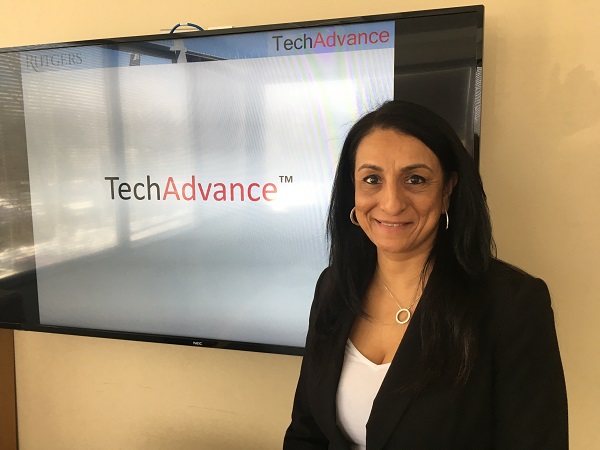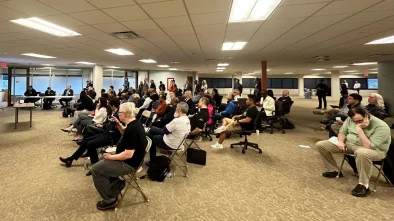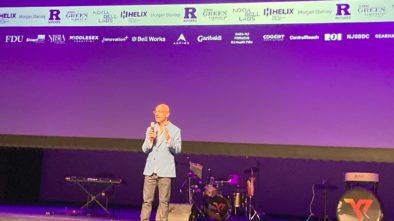Rutgers TechAdvance Fund Helps Innovative Researchers Get From R&D to Commercialization
A Rutgers University fund provided more than $2 million to help the school’s researchers working on innovative technologies take the next step in what can be a long and costly journey toward bringing new products to market.
Launched in 2017, the university’s TechAdvance Fund has awarded grants totaling $2.65 million to more than 30 faculty members conducting research on mostly early-stage STEM-related technologies in various phases of commercialization.
So far, three companies have licensed technologies developed by fund recipients. Two other Fortune 1000 companies now have the option to license the school’s technologies, while a venture capital firm gave a gift to two research teams to help advance their technologies.
The fund, established with more than $1 million of seed money from the university’s Office of Research and Economic Development, has awarded grants to projects ranging from life sciences and medical devices to materials science and engineering.
Some examples include virtual reality technology for the rehabilitation of post-stroke patients; a new medical imaging technology to identify and track cancer; an app to diagnose psychiatric diseases; wearable sensors that facilitate data analytics in clinical trials for patients with nervous system disorders; and a lightweight, high-performance graphene-based material designed to create stronger and impact-resistant products for the aerospace, automotive and military sectors and for other commercial uses.
Bridging the Gap Between Basic Research and Marketable Technologies
University officials view the fund as a critical step toward bridging the gap between basic research and marketable technologies. Rutgers and other higher-education institutions have introduced this type of funding in response to the reductions in federal and state government spending on these projects in recent years.
“A [funding] gap often exists between basic research and trying to move a project toward commercialization” at universities and colleges across the country, said Pavita Howe, director of the TechAdvance Fund. “We want to bring these projects to the point where they can find additional funding or partners, with the ultimate goal of commercialization either through licensing, the creation of a startup, or some kind of an industry collaboration.”
The TechAdvance Fund, referred to as a “gap” or “proof-of-concept” fund, offers grants of up to $100,000 to the university’s researchers working on projects deemed worthy of commercialization. Rutgers has also established another fund, called “TechXpress,” which provides grants of up to $10,000 for projects that require less funding and can be completed within six months.
Funding for projects requires that researchers submit an application for evaluation by industry reviewers who are considered experts in their respective fields, have a firm grasp of regulatory and legal issues and have successfully brought products to market. The fund has more than 80 industry reviewers vetting projects.
Getting approved for funding doesn’t always mean that the technology is a potentially huge commercial success; it might just mean that it could have a discernible impact on the market. “Sometimes we will approve things knowing that they are not going to be the next blockbuster drug, but they are going to go out in the world and help society,” Howe noted.
Building the Innovation Pipeline at Rutgers
The fund’s creation was the result of an idea championed by Yair Harel, the university’s executive director of new ventures and commercialization funding. The fund also had the backing of other university officials, including University President Robert L. Barchi; Christopher Molloy, chancellor of Rutgers University‒New Brunswick, who was at the time senior vice president for research and economic development; and S. David Kimball, who is currently the interim senior vice president for research and economic development.
Recently, the TechAdvance Fund was added to the Rutgers University Foundation’s Online Giving website (search for “TechAdvance”), allowing individuals, companies and other organizations to make tax-deductible contributions directly to the fund.
“This is a great opportunity for the Rutgers community to help us build up the innovation pipeline at Rutgers,” said Sacha Patera, associate vice president of the Rutgers Corporate Engagement Center, which is a joint venture between the Rutgers University Foundation and the university’s Office of Research and Economic Development.
While it has been nearly a decade since the state government last provided funding for academic research on cutting-edge technology, that may change if legislation reinstating a state agency results in renewed funding for technology projects.
In August, Governor Phil Murphy signed Assembly Bill 3652, which reestablished the defunct New Jersey Commission on Science and Technology as the New Jersey Commission on Science, Innovation and Technology. The legislation requires the new commission to appoint some of its members to find ways to strengthen cooperation between the state’s academic institutions and industry on innovative technologies, which could possibly include state funding.
Some Rutgers technologies were recently brought to market. While they weren’t TechAdvance Fund recipients, their ability to progress from research projects to commercialization served as an impetus for Rutgers to create a funding vehicle to support future commercial technologies.
One of those Rutgers technologies now on the market is a treatment for a form of Batten disease, a fatal inherited nervous-system disorder that occurs in infants and children. Another one is antibacterial envelope technology used to reduce the cost and complications associated with cardiac pacemaker infections.
Unlike traditional tech startups, the university’s research projects often require more time, money and other resources before they are ready to go to market. “It’s not like many typical tech startups, where they might develop something and it goes to market very quickly,” said Howe. “Our new technologies take time, and need an ecosystem that supports them every step of the way in order to bring these important innovations to market.”




